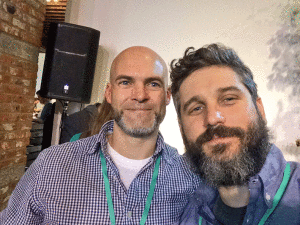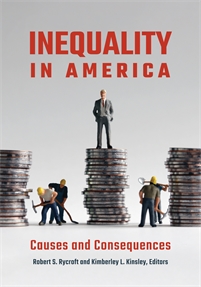 On June 30, College of Business Senior Lecturer Kimberley Kinsley and Professor of Economics Robert Rycroft will have a book published, Inequality in America: Causes and Consequences, Santa Barbara, CA:ABC-CLIO. https://products.abc-clio.com/ABC-CLIOCorporate/product.aspx?pc=A5815C. It is an edited book consisting of 35 essays written by 50 authors, with substantial contributions from Kinsley and Rycroft. Kinsley wrote a chapter about civil justice. Rycroft, along with Lauren DiRago-Duncan ’15, now a Ph.D. candidate at the University of Kentucky, wrote a chapter on labor markets. Both Kinsley and Rycroft wrote the preface and a chapter on wealth inequality. In addition, Assistant Professor of Education Christy Irish, along with Allison Ward Parsons from George Mason University’s College of Education and Human Development, wrote a chapter on education reform policies. President Troy Paino wrote the introduction.
On June 30, College of Business Senior Lecturer Kimberley Kinsley and Professor of Economics Robert Rycroft will have a book published, Inequality in America: Causes and Consequences, Santa Barbara, CA:ABC-CLIO. https://products.abc-clio.com/ABC-CLIOCorporate/product.aspx?pc=A5815C. It is an edited book consisting of 35 essays written by 50 authors, with substantial contributions from Kinsley and Rycroft. Kinsley wrote a chapter about civil justice. Rycroft, along with Lauren DiRago-Duncan ’15, now a Ph.D. candidate at the University of Kentucky, wrote a chapter on labor markets. Both Kinsley and Rycroft wrote the preface and a chapter on wealth inequality. In addition, Assistant Professor of Education Christy Irish, along with Allison Ward Parsons from George Mason University’s College of Education and Human Development, wrote a chapter on education reform policies. President Troy Paino wrote the introduction.
Greenlaw Comments on Open Educational Resource Tools
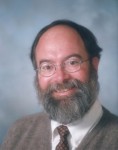
Professor of Economics Steven Greenlaw
Professor of Economics Steve Greenlaw was recently interviewed in an article on Ed Surge entitled, “‘Better Every Semester’: How Faculty Use Open Educational Resources to Improve Courses.”
In addition to providing students with text and video content, courseware tools also have built-in nudges and assessments—sometimes personalized—that generate instant feedback about whether students are mastering the assigned material.
That data allows an entity like Lumen to “crunch the numbers and figure out where the problems are” with courseware texts and tests, then fix those problems, says Steve Greenlaw, a professor of economics at the University of Mary Washington, who has helped to produce OER resources for Lumen and for OpenStax, a nonprofit OER publisher, and who uses Lumen courseware with his own classes. Read more.
Rycroft Discusses How Virus-Linked Recession Affects Women, Minorities
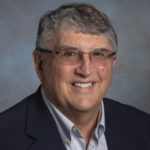
Professor of Economics Robert Rycroft
Professor of Economics Robert Rycroft recently discussed with Courthouse News the effect the recession, due to the COVID-19 pandemic, has had on women and minorities.
Pew reported Thursday that women, particularly Hispanic women, fared much worse in the coronavirus recession than during the Great Recession of 2007-09. Conversely, African-American men, who saw a peak unemployment of 21.2% during the Great Recession, have seen only a 15.8% top unemployment rate this time around.
“The disparities have a lot to do with the different mix of occupations,” said Robert Rycroft, an economics professor at the University of Mary Washington. Rycroft noted that in previous recessions manufacturing and construction suffered more than the service sector. “Some jobs were very susceptible to the effects of the virus,” Rycroft said. Read more.
Greenlaw Quoted on Grade Distribution in Inside Higher Ed
Professor of Economics Steven Greenlaw was quoted in an article on InsideHigherEd.com entitled “Forced to Fail Students?” The article examines an accusation by a former professor at Arizona State University who says he was fired for failing to adhere to grading quotas. “Asking professors to strictly follow a grade distribution is highly unusual,” Greenlaw said. “If a professor is giving out too many A’s, that might necessitate a conversation, but not a mandate to fail a specific proportion of the class.” Read more.
President Hurley Is Taking the Two Dollar Challenge, Will You?
That’s right – our own president is taking the Two Dollar Challenge April 6-10 to raise awareness of global poverty. The question is – will you?
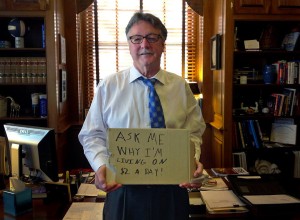 Now a national educational movement, the Two Dollar Challenge was founded at UMW in 2006 and is run by eight UMW students and Professor of Economics Shawn Humphrey – all on $50 and volunteer support.
Now a national educational movement, the Two Dollar Challenge was founded at UMW in 2006 and is run by eight UMW students and Professor of Economics Shawn Humphrey – all on $50 and volunteer support.
The 5-day awareness program challenges college and high school students across the United States to live on just two dollars a day. Participants buy food, hygiene products and other necessities out of two dollars a day while following other rules designed to simulate obstacles faced by people living in poverty.
At UMW, students will spend the week living and sleeping in make-shift shelters built from cardboard boxes and tarps as part of an experiential learning experience.
So I have to sleep in a tent on Ball Circle?
Not at all. Start small with the beginner level – 3 days and 2 nights with $6 total to spend and you can sleep in your own bed and take hot showers in your own home.
Want to sign up or learn more?
- Visit the challenge’s website at twodollarchallenge.org.
- Come to an information session Thursday, March 19 at 5 p.m. in the ITCC’s Digital Auditorium.
- Use #2DollarsADay to join the conversation on social media.
Hansen Publishes in Business History Review
Professor of Economics Bradley A. Hansen’s article “A Failure of Regulation? Reinterpreting the Panic of 1907” was recently published in Business History Review.
Humphrey and Alum Present at Feast on Good Conference
Shawn Humphrey, associate professor of economics, presented at the Feast on Good Conference in Brooklyn, New York on Saturday, Oct. 11. His seminar, entitled Tribal Teaching: Rewild Your Students, was one of several presented throughout the weekend that focused on discussions about global issues. In addition, UMW Alum Jon Pack ’95 gave a talk during the conference. He co-presented with Gary Hustwit about Helvetica, The Olympic City.
Students Live on $2 a Day to Raise Money and Awareness for Poverty Issues
For a week at the beginning of April, senior Andrew Walz and more than 35 fellow students moved out of their residence halls at the University of Mary Washington and tried to ignore the smell of food from campus dining halls.
The students, along with Associate Professor of Economics Shawn Humphrey were participants in the annual Two Dollar Challenge, an experiential learning exercise aimed at raising awareness and funds for poverty-related causes.
We followed Walz, who plans to join the Peace Corps after graduation, throughout the week:
“It’s always interesting to see the campus community’s reaction to our camp when it goes up on the first day. I remember walking by the camp my freshman year with my head down, hoping to avoid being dragged into conversation with people outside of the tent. While there are certainly some people who treat us the same way I did, there does seem to be genuine interest among some students.”
“It is always nice when people come by, look at the tent wide eyed, and ask why we would ever want to do something like sleep outside or live meagerly when we could so easily do so otherwise. Their questions are often genuine and the start of a good conversation where we can talk about poverty. These interactions always confirm my belief in TDC as a change making activity at UMW.”
The students lived in a self-made structure on Ball Circle and spent only $2 each day on food and other expenses. In the process, they hoped to raise more than $5,000 for La Ceiba, a microfinance institution, while shedding light on poverty issues.
“For me, the mental fatigue that comes with living on such a small level of nourishment is much worse than the physical issues. Even trying to go to class and focus or doing homework outside is 10 times more difficult this week than it is on any other week. The lack of food makes focusing that much harder, and that combined with being outside as much as possible makes getting things done nearly impossible but I have to keep trying. It just puts the situation of the poor into perspective because my troubles with class cannot even compare to trying to hold down a job, search for a job, or taking care of a family.”
The Two Dollar Challenge, founded by Humphrey, is in its eighth year at UMW. The challenge has spread across the country, and this year has taken up roots internationally. Junior Jeff Paddock is participating in the challenge for one month while studying abroad in Peru. He is sharing his experience in a blog.
The challenge is part of the larger TDC organization, which also includes the Month of Microfinance movement and the Poverty Action Conference.
“I would like to think that even the memory of our tent camp will be enough to spark conversation for a few days after we have packed up and moved back into the normal college life. That’s the objective of TDC, to provoke conversation and to give all members of the UMW community a chance to open up and think about their relationship with their fellow community members, whether they be rich or poor. And who knows, maybe we inspired someone to participate next year who had been on the fence this year!”
For more information about the Two Dollar Challenge or to participate in next year’s challenge, contact Humphrey at shumphre@umw.edu.
Economics Class Learning the Ropes
Shawn Humphrey and 10 economics students roped in teamwork and built camaraderie Oct. 19 after attending a daylong retreat to Challenge Discovery at University of Richmond.
“We run a microfinance organization in Honduras and an important part, very important part, of being effective and delivering on our services to over 55 clients is to work with creativity and collaboratively as a team,” said Humphrey, associate professor of economics.
The microfinance organization, La Ceiba, is a student-run program that operates in El Progreso, Honduras working to help the people of El Progreso beat poverty.
Students Meet with Nobel Peace Prize Winner
Associate Professor of Economics Shawn Humphrey and more than a dozen current UMW students and graduates met with Bangladeshi banker, economist and Nobel Laureate Muhammad Yunus during a trip to Washington, D.C. on Monday, July 22. The meeting was a reward for the students’ work with the Month of Microfinance and La Ceiba.
Yunus, founder of the Grameen Bank, is the seventh person to have received the Congressional Gold Medal, the Presidential Medal of Freedom and the Nobel Peace Prize. He is credited with establishing the concept of microfinance and was recently named one of the most influential business thinkers by the Wall Street Journal.
